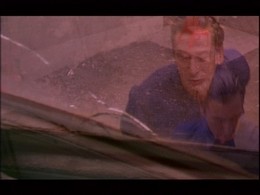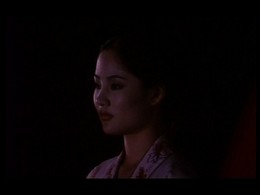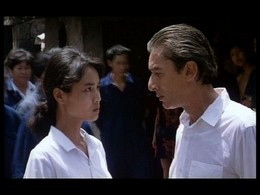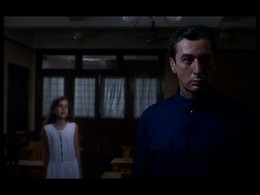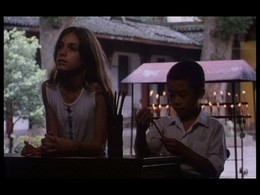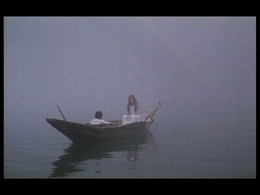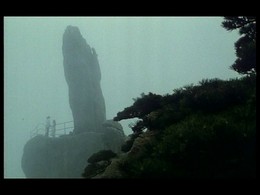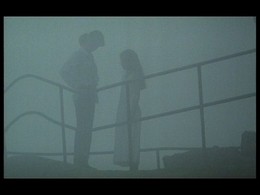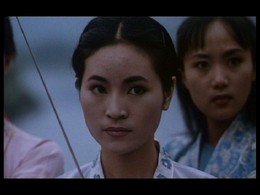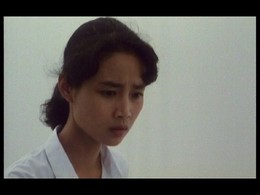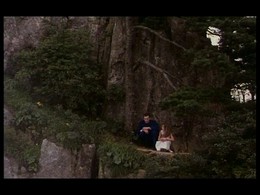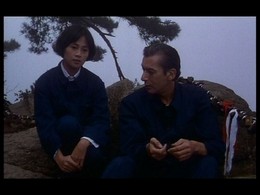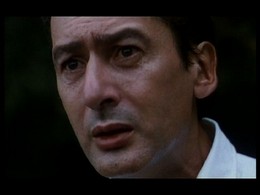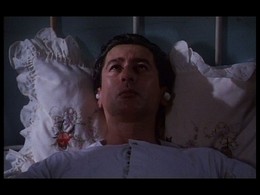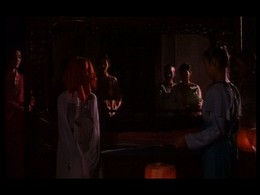My chinese sister 1994, 95 minutes
Screenplay, director and editing : Alain Mazars
Produced by Martine et Antoine de Clermont-Tonnerre.
Cast : Alain Bashung, Ru Ping, Jean-François Balmer, Laure de Clermont
Cinematography : Jacques Bouquin
Sound : Jean-Claude Brisson
Music : Olivier Hutman
"VILLA MEDICIS HORS LES MURS" AWARD of Ministry of Foreign Affairs.
On general release in France, in 1994.
Selected in many film festivals : Cannes (Acid), Varsovie, Tübingen, Budapest, Aix-En-Provence, Chambéry, Saint Malo, Gardanne, Chalon-sur-Saone
TV Broadcast : Canal plus and abroad.
Music : Olivier Hutman.
Synopsis
In 1977, one year after Mao died, a French man ( played by Alain Bashung) comes back to China to work as a school teacher with his daughter. He quickly ignores the interdiction of getting in touch with Chinese people and finds himself drawn into mysterious meetings at the Red Pavilion. MY CHINESE SISTER is a movie about pretense and the mystification of reality.
Press releases
PREMIERE. november 1994.
The idea of China as a cinematic theme is like a multi-stage rocket. First we had the fantasy of an ideal world with the Maoists of 1968, then the glamour of the LAST EMPEROR by Bernardo Bertolucci in 1987, and finally the Palme d'Or for FAREWELL MY CONCUBINE in 1993. But afterwards, each exotic stage of the rocket falls back into oblivion. Alain Mazars, on the opposite, has been building a relationship with China over the last fifteen years, through several movies and trips there. The Chinese half-sister role he gives to a little French girl is a way to build a sense of family (and not familiarity) ) within this baffling country where foreigners are confined to a foreigners house. Mazars' take on this is both lucid and complex, shot from a man's (and child's) point of view (as we can see from the wise use of horizontal panoramas). Two worlds collide here: the traditional world with theatrical postures and the world of the blue statutory outfits. The world of dreams and the world of reality. The world of childhood and the world of adulthood. Here, Bashung physically becomes Chinese throughout the movie, and also becomes crazy. Like someone trying to make sense of something totally incoherent. The movie asks the question that is asked in all tales: "Can you act like an adult and yet see the world through the eyes of a child?" With Jean-François Balmer playing an hirsute maniac, with two young (and very beautiful) Chinese actresses and above all a very masterful direction, almost like ballet, Alain Mazars deserves better than people just going to see his movie out of curiosity. He deserves to be known as the only Western movie director who has really explored the idea of China, with a lot of love and in an uncompromising way. Jean-Jacques Bernard
POSITIF. december 1994.
Maybe those who discovered Alain Mazars with his magnificent movie LOST SPRING will be baffled by MY CHINESE SISTER. His previous movie had a kind of clarity, a very steady narrative, an unwavering way of dismissing all the cliches and codes that are part of the French cinema nowadays. He was able to grasp in a very tangible and real way, and without any affectation, a culture that is so foreign and strange. Beyond China, Mazars gives us access to the Eastern sensitivity and mentality as a whole, even though they are still somewhat intangible and inscrutable for a Westerner. For all these reasons, we at POSITIF celebrate the birth of a new and genuine author. The fact that he voluntarily baffles us today should be considered as proof of the richness of his potential and of how much of a risk taker he is. I will talk later about all the experimenting and audacity present in MY CHINESE SISTER. Here the director chose to keep the narrative on a very steady road but at the same time the different story lines are intertwined to the point where you start having doubts. MY CHINESE SISTER is a very romantic movie. The description of the lives of volunteers who went to China after Mao's death is very realistic, but the movie also includes elements of a fairytale: Blanche, being a naive ten-year-old girl, is going through her mirror to enter another world, a world where the dead talk with the living and where ghosts are real beings. The superiority of the child's intelligence and sensitivity is revealed time and time again in the movie, in many different ways. Mazars totally reject the adult vision and embraces an understanding of the visible and the invisible that is totally irrational. He then takes things to the next level, the imaginary world and dreams. In this movie, Bashung, haunted and hallucinating, playing a very human character who rejects the ordinary, is simply phenomenal. François Ramasse
TELERAMA. 9 november 2994.
... a director who continues his demanding and non conforming work with a lot of modesty and delicacy. Bernard Génin
LE MONDE. 9 november 2994.
... Alain Mazars knows China very well ... mesmerizing. Jean-Michel Frodon
TELE K7. 12 november 2994.
... Well served by the spot on performance of Alain Bashung, a magical and poetic universe full of sensitivity... A must-see. Estelle Ruet
L'ANNEE DU CINEMA. 1995.
gorgeous images for a strange and yet resolutely poetic movie.
LA CROIX. 16 november 2994.
Always a highly singular approach... A deeply personal and poetic writing.
LE NOUVEL OBSERVATEUR. 9 november 2994.
... A dreamlike atmosphere and images that are reminiscent of Chinese painting.
FRANCE SOIR.
... You can see that Mazars knows China very well. Bashung is perfect.
TELE 7 JOURS. 9 november 2994.
... The subtle charm of this very romantic and deeply personal movie reveals a deep knowledge of Chinese culture Jean françois Balmer is remarkable.
FRANCE INTER. 9 november 2994.
... a movie that I really love. José Arthur
CANARD ENCHAINE. 16 november 2994.
... a very charming movie.
LE FIGARO.
... wandering daydream. A must see.
TELECABLE.
... a movie with gorgeous images and a compelling poetic atmosphere.
EUROPE 1. 5 november 1994.
... a very beautiful movie. Rémo Forlani
Pictures

